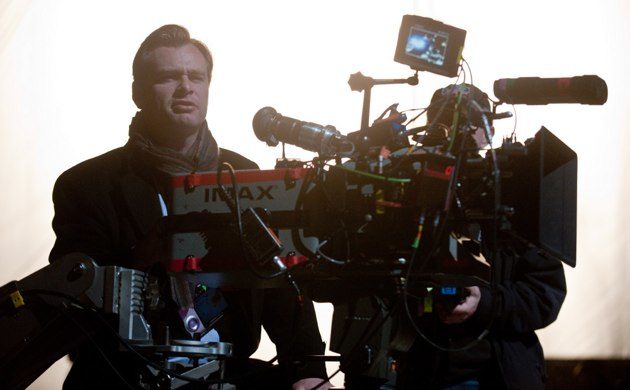Christopher Nolan Really, Really, Really Not Giving Up Shooting on Film

There's so much good stuff in this new DGA Quarterly interview (particularly about the joys of IMAX), but for the record, Christopher Nolan isn't messing around with his commitment to shooting on old-fashioned glorious film. And according to Nolan, his peers shouldn't be, either:
Q: You and your cameraman, Wally Pfister, are—along with Steven Spielberg—among the last holdouts who shoot on film in an industry that’s moved to digital. What’s your attraction to the older medium?
A: For the last 10 years, I've felt increasing pressure to stop shooting film and start shooting video, but I've never understood why. It's cheaper to work on film, it's far better looking, it’s the technology that's been known and understood for a hundred years, and it's extremely reliable. I think, truthfully, it boils down to the economic interest of manufacturers and [a production] industry that makes more money through change rather than through maintaining the status quo. We save a lot of money shooting on film and projecting film and not doing digital intermediates. [...] I've just carried on making films in the way that works best and waiting until there’s a good reason to change. But I haven't seen that reason yet.Q: Have you ever thought about communicating your feelings to the industry and other directors?
A: I’ve kept my mouth shut about this for a long time and it’s fine that everyone has a choice, but for me the choice is in real danger of disappearing. So right before Christmas I brought some filmmakers together and showed them the prologue for The Dark Knight Rises that we shot on IMAX film, then cut from the original negative and printed. I wanted to give them a chance to see the potential, because I think IMAX is the best film format that was ever invented. It’s the gold standard and what any other technology has to match up to, but none have, in my opinion. The message I wanted to put out there was that no one is taking anyone’s digital cameras away. But if we want film to continue as an option, and someone is working on a big studio movie with the resources and the power to insist [on] film, they should say so. I felt as if I didn’t say anything, and then we started to lose that option, it would be a shame. When I look at a digitally acquired and projected image, it looks inferior against an original negative anamorphic print or an IMAX one.
OK? No one's trying to take away your digital camera! Sheesh. Anyway, great read.

Comments
I love Nolan's work and cred so far. But it's on hold now. This attitude that film is cheaper????? Shooting on film requires much more money on so many levels...as well as NOT BEING DEMOCRATIC at all. It's about keeping the power in the hands of a select few. Digital is the world we live in now and the future...and as the digital based tech changes in cameras, lenses, lights, editing and cgi work, etc., it simply means the distrib. route of these digital based products will be more acceptable to the world audience...and cheaper as well.
I guess once Hollywood decides you're cool enough to come in their open gates -- when you prove yourself to make them money on their terms only -- then it must be a whole different story.
Good to see the same folks you want to tell stories to Chris...are the same you want to keep locked out of Hollywood as writers-directors ourselves.
well what Nolan is probably referring to is the cost on the larger scale. Digital preservation costs double to almost triple what it normally costs because of constantly changing formats, machines, etc. etc. Digital Projection bulbs are three times MORE likely to blown then normal 35mm print projectors- not to mention that on a 35mm projector if the blub blows it blows no harm done, however with digital there's alot of costly hardware closely pakaged together that it's not uncommon for a $600 bulb to blow and then break almost $1000 in parts all together, not to mention replacement bulbs. Digital maintenace is also really not good. Toy Story 2 very famously was almost deleted from a simple computing error when it was stored on a Linux server. Imagine a classic film you love and hold dearly- disappearing FOREVER. whereas with 35mm prints overall you don't lose jobs or the film once it's properly preserved. Nolan thinks in the big picture.